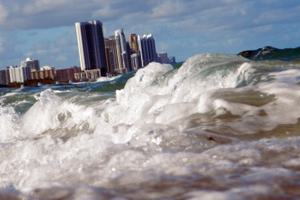Europe
-
On the Road to Green Energy, Germany Detours on Dirty Coal
While Germany continues to expand solar and wind power, the government’s decision to phase out nuclear energy means it must now rely heavily on the dirtiest form of coal, lignite, to generate electricity. The result is that after two decades of progress, the country’s CO2 emissions are rising.
-
Mimicking Nature, New Designs Ease Fish Passage Around Dams
Originating in Europe, \"nature-like\" fishways are now being constructed on some U.S. rivers where removing dams is not an option. Unlike traditional fish ladders, these passages use a natural approach aimed at significantly increasing once-abundant runs of migratory fish.
-
As Fracking Booms, Growing Concerns About Wastewater
With hydraulic fracturing for oil and gas continuing to proliferate across the U.S., scientists and environmental activists are raising questions about whether millions of gallons of contaminated drilling fluids could be threatening water supplies and human health.
-
Animal ‘Personhood’: Muddled Alternative to Real Protection
A new strategy of granting animals “personhood” under the law is being advanced by some in academia and the animal rights movement. But this approach fails to address the fundamental truth that all species have an equal right to their own existence.
-
Greenpeace’s Kumi Naidoo on Russia and the Climate Struggle
In a Yale Environment 360 interview, the outspoken executive director of Greenpeace discusses why his organization’s activists braved imprisonment in Russia to stop Arctic oil drilling and what needs to be done to make a sharp turn away from fossil fuels and toward a green energy economy.
-
Documenting the Swift Change Wrought by Global Warming
Photographer Peter Essick has traveled the world documenting the causes and consequences of climate change. In a Yale Environment 360 photo essay, we present a gallery of images Essick took while on assignment in Antarctica, Greenland, and other far-flung locales.
-
In South Africa, Renewables Vie With the Political Power of Coal
Although coal has dominated the South African electricity sector for decades, the country’s abundant solar and wind resources offer a promising renewable energy alternative. But entrenched political interests connected to the ruling party are fighting to expand coal’s role in the national economy.
-
A Successful Push to Restore Europe’s Long-Abused Rivers
From Britain to the Czech Republic, European nations have been restoring rivers to their natural state — taking down dams, removing levees, and reviving floodplains. For a continent that long viewed rivers as little more than shipping canals and sewers, it is a striking change.
-
A Key Mangrove Forest Faces Major Threat from a Coal Plant
As Bangladesh makes a controversial turn to coal to produce electricity, the construction of a large coal-fired power plant is threatening the fragile ecosystem of the Sundarbans, the world’s largest mangrove forest.
-
Rising Waters
How Fast and How Far Will Sea Levels Rise?
-
Iceland Seeks to Cash In On Its Abundant Renewable Energy
Still reeling from recent financial crises, Iceland is hoping to use its bountiful sources of geothermal and hydroelectric energy to help boost its economy. Among the country’s more ambitious plans is an undersea cable to carry renewably generated electricity to the U.K.
-
Will Offshore Wind Finally Take Off on U.S. East Coast?
After years of delays and legal battles, several offshore wind projects seem poised to be launched off the U.S. East Coast. But the lack of stable government incentives and tax credits may continue to hobble an industry that already has a strong foothold in Europe.
-
Poaching Pangolins: An Obscure Creature Faces Uncertain Future
The pangolin does not make headlines the way elephants or rhinos do. But the survival of this uncharismatic, armor-plated animal is being threatened by a gruesome trade in its meat and its scales.
-
How High Tech is Helping Bring Clean Water to India
Anand Shah runs a company that is using solar-powered “water ATMs” to bring clean water to remote villages in India. In an e360 interview, Shah talks about how his company is using a high-tech approach to address one of India’s most intractable public health issues.
-
With Rooftop Solar on Rise, U.S. Utilities Are Striking Back
Faced with the prospect of a dwindling customer base, some U.S. power companies are seeking to end public subsidies and other incentives for rooftop solar. In Arizona, the issue has sparked a heated public relations battle that could help determine the future of solar in the United States.
-
Incineration Versus Recycling: In Europe, A Debate Over Trash
Increasingly common in Europe, municipal “waste-to-energy” incinerators are being touted as a green trash-disposal alternative. But critics contend that these large-scale incinerators tend to discourage recycling and lead to greater waste.
-
Why Pushing Alternate Fuels Makes for Bad Public Policy
Every U.S. president since Ronald Reagan has backed programs to develop alternative transportation fuels. But there are better ways to foster energy independence and reduce greenhouse gas emissions than using subsidies and mandates to promote politically favored fuels.
-
The War on African Poaching: Is Militarization Doomed to Fail?
African countries and private game reserves are engaging in an increasingly sophisticated arms race against poachers, yet the slaughter of elephants and rhinos continues. Some experts argue that the battle must be joined on a far wider front that targets demand in Asia and judicial dysfunction in Africa.
-
The Rise of Rubber Takes Toll On Forests of Southwest China
In one of China’s most biodiverse regions, the spread of rubber plantations to supply the country’s burgeoning automobile industry is carving up habitat and harming watersheds and tropical forest ecosystems.
-
Leaving Our Descendants A Whopping Rise in Sea Levels
German scientist Anders Levermann and his colleagues have released research that warns of major sea level increases far into the future. In an interview with Yale Environment 360, he raises important questions about how much we really care about the world we will leave to those who come after us.

